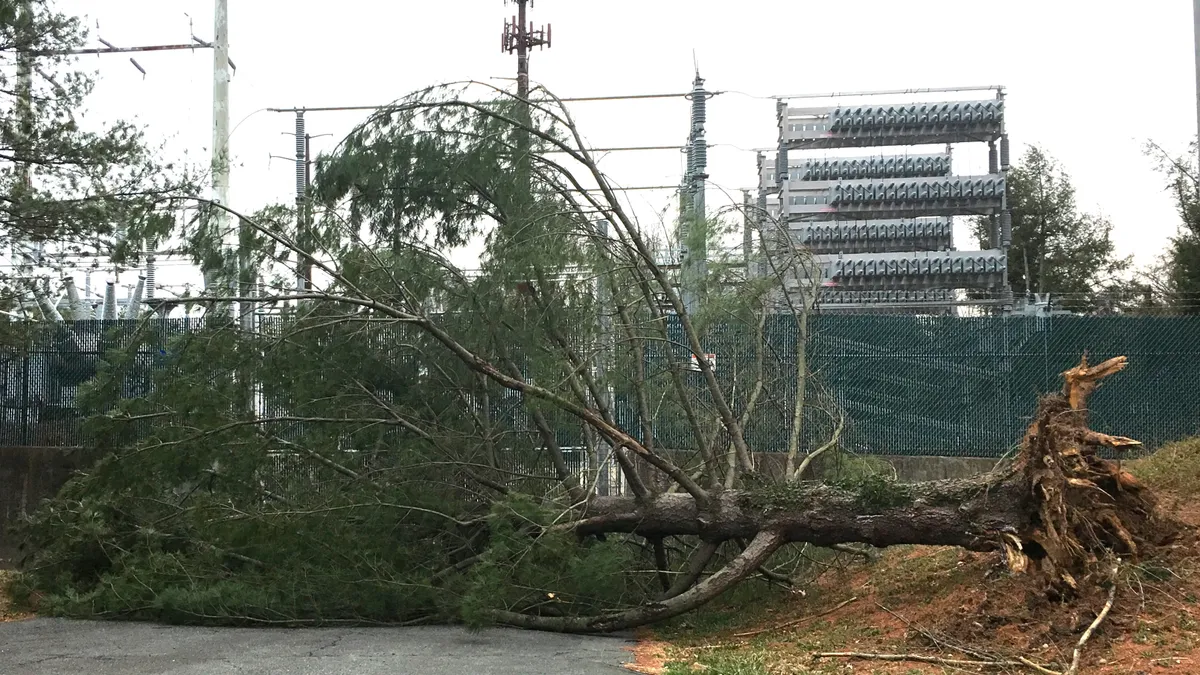Dive Brief:
- The U.S. Department of Energy on Tuesday published a pair of requests for information (RFI) in the Federal Register, seeking public comment on how the electric grid and oil and gas pipelines can be made more resilient to severe weather events like windstorms, floods, wildfires and other disasters.
- DOE said the information it gleans could be used to structure future agency programs, and any gaps it uncovers may be addressed through targeted research and development along with emergency preparedness actions by government agencies and the private sector.
- Electric utilities have turned to grid modernization, automation and enhanced recovery strategies to improve storm recovery times in the last decade. An ICF report last year on the nation's pipeline system found room for improvement but concluded backup gas-fired generation can play a major role in energy resiliency.
Dive Insight:
DOE wants to find "cost-effective" ways to make electric infrastructure systems more resilient against severe weather events, and to guard oil and gas infrastructure against cyber and physical threats as well.
"Concern among government agencies, utilities, and the public about the risks presented by more frequent and more severe weather events has led to widespread discussion about how to make electric infrastructure systems more resilient against such hazards, and how to do so effectively and at reasonable cost," DOE said in its electric grid RFI. "This is challenging to do, however, given the many uncertainties and variables associated with weather-related events."
DOE said it is looking to gather available information on current "consensus-based codes, specifications, standards, and other forms of guidance," for improving the resilience of electric systems.
The inquiry includes both the design and operation of these systems. DOE said it is interested in specific technical design standards, relevant corporate business practices and analytic methods and tools for estimating the possible economic benefits from "strategies, investments, or initiatives to enhance power system resilience."
The oil and gas RFI notes that those industries have been working for years to develop a culture of resilience, but added that "at present there is no settled body of expert knowledge about requirements and practices for enhancing the resilience of these systems."
RFI responses are due 45 days after publication in the Federal Register.
In the electric sector, power companies are susceptible to tornadoes, hurricanes, wildfires, nor-easters, earthquakes or mud slides, depending on the region. Pipelines are more resilient in some scenarios because the infrastructure tends to be underground.
ICF's report last year on pipeline resilience recommended utilities sub-divide their gas systems so that when service isolation is necessary, it can be done on a more granular level.
Electric utilities facing severe weather have turned to storm hardening efforts, like upgrading utility poles, as well as automated grid management technologies to speed recovery.
Florida Power & Light is one example of the utility sector responding to growing storm threats. When Hurricane Wilma struck Florida in 2005, it took more than two weeks for FPL to return power to 95% of customers. When Hurricane Irma hit in 2017, affecting more than 4.4 million customers, it took the utility less than a week to reach that recovery milestone.
The industry has also revamped how utilities coordinate mutual assistance, allowing more workers to quickly repair downed lines.
In California, utilities are struggling to deal with wildfires and this year new state laws required updated mitigation proposals and gave power companies new tools. As a result, Pacific Gas & Electric last month, for the first time, proactively de-energized portions of its grid during a high wind event, to reduce the risk of sparking a fire.
"There are regional specific differences between all areas of the country, across all manner of threats," Scott Aaronson, vice president of security and preparedness for the Edison Electric Institute, told Utility Dive. "The common theme is, it's better to prepare for the worst than to be caught flat footed."















